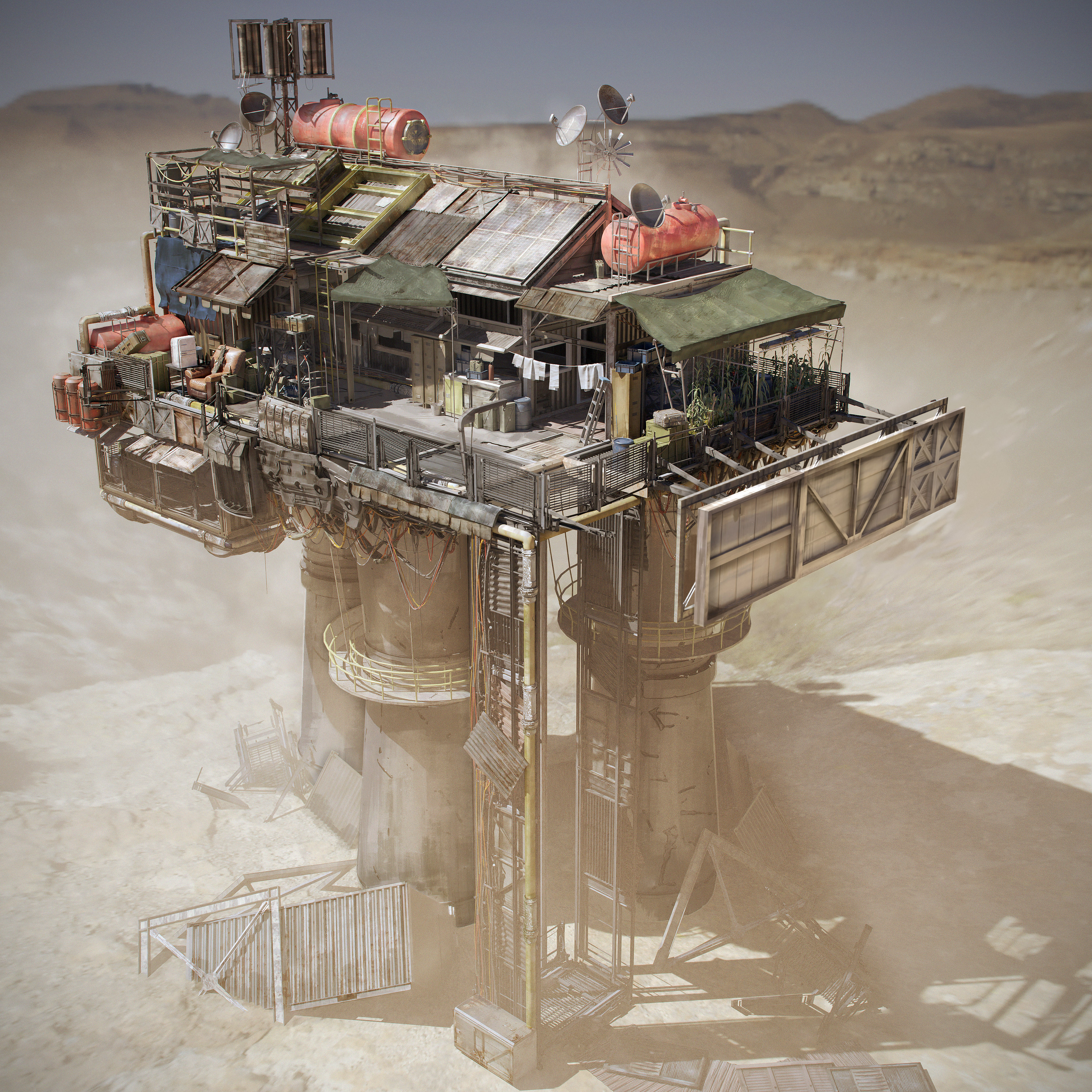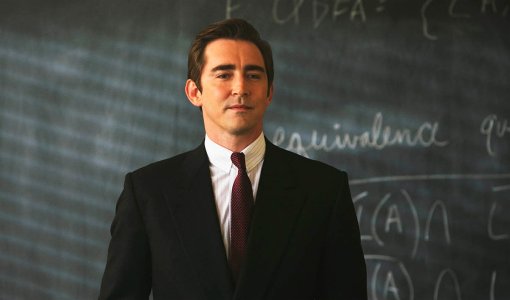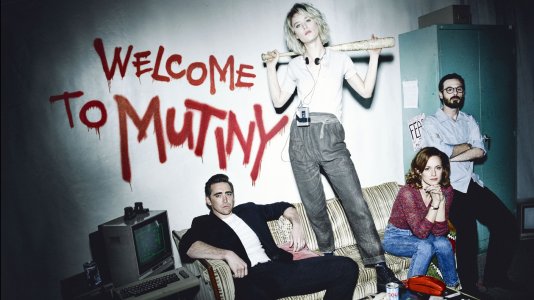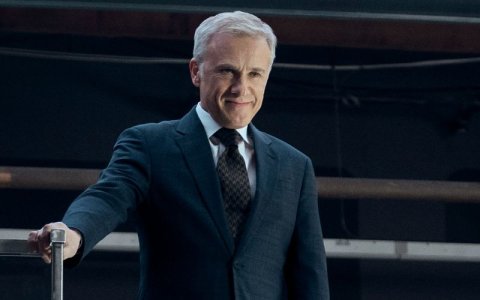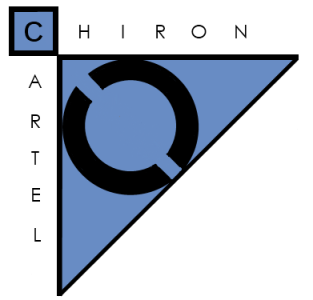Lords of Industry (pt. 2.3)
Chiron Cartel - Night-watchman state

Managing Agent Halah Farid Al-Rammah said:
Planetfall was absolutely tremendous for wiping the slate clean. Half a million of our species’ best, underwritten by the most sophisticated models ever devised. A whole world unblemished by the last six thousand years of overreach and error. Put away your textbooks: here, we can homestead our way to a truly efficient economy. - An Economist’s History of Planet
The Chiron Cartel is often referred to as a minarchy, a barebones government possessing only the vital tasks of maintaining physical security and adjudicating property disputes. Within its territory lies an incredibly diverse and ever-changing patchwork of corporations, small entrepreneurships, self-employed contractors, restless wanderers, and even a single small voluntary commune which owns a portion of the Hab Complex in the first base. Given the mandate from Director Nathan Weismuller to go forth and discover, many ventures have embraced technological development, rejecting petty politics. Often, it more resembles a research park than an actual faction.
Despite the massive proliferation in private wealth in the final days before the
Unity’s mission, such a system was rarely found on Earth. Corporate power simply ran rife in degenerated republics such as the United States, working hand-in-hand with politicians who wielded true monopolies on force. Besides crony capitalist states, next were one-company regimes like the Morgan Industries-sponsored governments (“Mugatustans”) in the Ethiopias. These nations were hollowed-out hosts to the toxoplasma of wealthy patron businesses, their natural resources and people morphed into line items. Many of the quasi-faction corporeal entities on Planet, from Morgan Industries’ Dynamic Enterprise to the ARC-run New Two Thousand, are the natural successors to those corporate republics.
The Cartel ran differently. There, the market was the state.
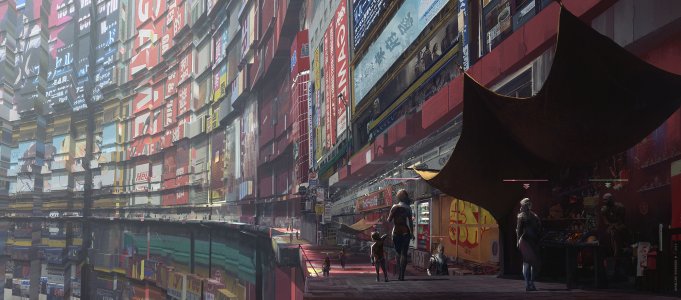 Dancing Word Spiral, an ad-supported public housing district of Lin Industries, second base founded by the Chiron Cartel. As a leading corporation of the faction, Lin’s leadership sought cost-effective measures for social issues caused by sprawl
Dancing Word Spiral, an ad-supported public housing district of Lin Industries, second base founded by the Chiron Cartel. As a leading corporation of the faction, Lin’s leadership sought cost-effective measures for social issues caused by sprawl
The
Self-selection hypothesis suggests that the diamond of the New Delaware River owes its technological and economic success to the choice individuals who joined it. From the very pools of the
Unity, Nathan Weismuller had attracted a particular assemblage. Entrepreneur self-starters who did not seek their fortune with existing firms, scientific iconoclasts who wanted to buck the orthodoxy of the academy while making a buck for themselves, huddled peace-loving masses fleeing the lawless indiscriminate violence - these would become citizen-clients under his Charter. And they would build the unique corporations of the Cartel.
Morgan Industries Corporate Historian Ginka Organa Ivanova has called the Cartelists “a flock of lambs posing as sharks.” She was referring to the specific origin of how the companies came to be- not founded from the business battlefields of Earth, but in the frontier hallways of Cartel Headquarters. As the faction deigned not to provide any services beyond the necessity of keeping the base’s life support systems functional to ensure that the insurance company remained in operation, all of the early citizens’ needs- electricity, water, food, clothing, and data- were provided by those who had the skills and knowledge to do so.
Encouraged by the founder and the general zeitgeist, these providers started businesses rather than volunteering out of altruism or solidarity. As these firms were founded by those who bought into Weismuller’s ideological vision, they generally viewed themselves as acting in enlightened self-interest rather than for simple self-enrichment. Stiff competition from undercutters created low market rates, preventing price-gouging of crucial services. And it was also here that the long-hypothetical question of how a libertarian society would handle bad actors was put to the test: businesses that failed to provide adequate service as promised were subject to boycott by customers. In cases of extreme malfeasance, property courts levied ‘total boycotts:’ banishment from the base and certain demise from mindworms. The businesses that survived the Darwinian early days would do so on the quality of their product and the strength of their credibility. They expanded outwards while pushing the envelope of technological progress, turning the Cartel into a research powerhouse and a prime target for probe intrusions from all sides. Along the way, standards of living blossomed.
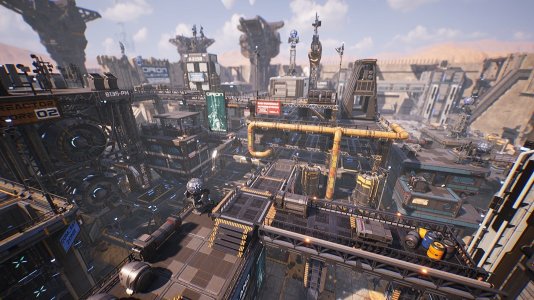 Red Jaguar Industrial Hypercomplex at Ikari Heavy Chemicals. Multicorporate arms manufacturing plant specializing in shagokhod robotic walker weapons platforms above multistory underground bioengineering laboratory. Urban legends tell of vast cloning facilities, brain organoid supercomputers, massive chambers hosting gargantuan Progenitor artifacts, all locked away under a protective subterranean Geofront
Red Jaguar Industrial Hypercomplex at Ikari Heavy Chemicals. Multicorporate arms manufacturing plant specializing in shagokhod robotic walker weapons platforms above multistory underground bioengineering laboratory. Urban legends tell of vast cloning facilities, brain organoid supercomputers, massive chambers hosting gargantuan Progenitor artifacts, all locked away under a protective subterranean Geofront
Since the Cartel is bound by Charter, the resultant culture emphasizes freedom and private progress rather than public action. Like the citizen-client electorate, Directors are usually off pursuing their own ventures. Weismuller Enterprises, the founder’s very own umbrella corporation, has established several of the faction’s bases for his personal companies in technology and finance. Day-to-day legislative proceedings are essentially debates on constitutional law, questioning what the so-called government can even do.
University of Planet factionologist Isidro Nopaltzin Centinela, of the Preservationists of Terra research unit at Planetary Archives, described the Chiron Cartel’s corporate democracy as “vibrant but low-participation, orthogonal to actual issues. More like the Renaissance era Venetian oligarchy than modern republics.” As with the merchants of Venice, the initial Board of Directors created an intentionally convoluted system to prevent despotism from taking root. While the Cartel does not explicitly have as many redundant and overlapping organs as the thalassocracy’s Great Council, Pregadi, Council of Ten, Signoria, and Collegio all checking and balancing one another, it does intentionally saddle its operations with long-drawn processes to ensure majority consent from the governed. Some say this system is akin to the rationale of the starve-the-beasters of the latter American republic: to turn the populace against taxation, they intentionally fostered a byzantine tax code to make government collection of revenue onerous and painful. Such as it is with governance in the Cartel.
 Tall White Fountains, the main trading floor of Cartel Headquarters. Located at the Menger Capital Building, the Fountains attracts untold numbers of business visitors and extrafactional tourists each mission year, waited upon by robotic assistants. The Board of Directors Assembly Hall, two floors above, receives only a tenth of interest
Tall White Fountains, the main trading floor of Cartel Headquarters. Located at the Menger Capital Building, the Fountains attracts untold numbers of business visitors and extrafactional tourists each mission year, waited upon by robotic assistants. The Board of Directors Assembly Hall, two floors above, receives only a tenth of interest
Politics, then, mostly serves as catharsis for citizens to express both frustrations and self-identities, rather than to affect day-to-day change:
Charter Party: Founded by Weismuller himself, the leading party champions its highest law against the corruption and regulatory capture that change might invite. Minarchists who insist upon continued safeguarding of the Charter against decline into slipping tyranny, seen in innumerable republics of Earth. The Director only reluctantly holds the mantle of power. Believing himself to be one of the very few capable of using the law to restrain the government, he self-limits his own abilities even in the face of constant intellectual property theft. This reluctance to govern makes the party incredibly popular among its self-interested citizen-clients.
Security Party: Considered the loyal opposition party of active servicemen and patrollers, veterans of difficult vendettas, arms contractor companies led by Superior Defense Services (SDS), and concerned citizens fearing the dangers of Planet. Though tarred as warmongers and jackbooted thugs by harsh critics, they are largely against changing the faction’s non-interventionist, dovish foreign policy, let alone amending the Charter. They simply ask for more support to Cartel Security whether by underwriting more funds to the defense budget, or simply by improving its organizational cohesion. The Security Party also considers its founder-led Board’s steadfast insistence on noninterference to be a liability. They point out at the number of obvious, egregiously blatant front organizations from rival factions and outsider corporations operating in the Cartel, leeching technology, and the lack of investigation. But Weismuller stands firm against creeping government, allowing only enforcement where there is clear evidence.
Industry Party: The last and most controversial of the three major parties, the home of monied interests, the crony capitalists, the complacent plutocrats. Accused of corruption, statism, and neoliberalism, they nonetheless have a compelling vision for the faction: true security depends upon its economic stability, and so the government should operate more to support private industry. Not only would it shore up competition against outside actors in the economic war for Planet, it would bolster living standards against tumult in employment markets. Despised by the founder as clearly seeking to put an oppressive thumb the scale, again picking winners and losers, the Industry Party has nevertheless gotten a foothold by both rent-seeking businesses and those wanting more predictability in the internal markets. Trading freedom for security in an area where the Cartel has little business operating in, but
potentially could enter. While both the cronyist and populist aspects of this message keeps it a political player, its internal coalition is constantly shifting as would-be beneficiaries filter in and out, corporations jockeying for who could stand to benefit the most from public coffers. It has also been tarnished as a potential vehicle for outsiders to enter the faction while weakening the Charter.
 A former major in the U.N. Security Forces, now Vice President of Security, Phillip Rickenbacker led the original patrols that guarded Planetfall Pool. Disillusioned by the naked authoritarianism exemplified by the U.N. Space Authority's Blue Operations division, he was impressed by how Weismuller provided a safe space for sheltering colonists without grabbing power. As leader of Cartel Security, he is constantly frustrated by its lack of resources and mandate, while consoled by its inability to enact coup or conquest. One of the most popular factional figures, Rickenbacker has remained true to the founder and Charter thus far, despite opinion polls suggesting he could lead the Security Party to its very first majority government
A former major in the U.N. Security Forces, now Vice President of Security, Phillip Rickenbacker led the original patrols that guarded Planetfall Pool. Disillusioned by the naked authoritarianism exemplified by the U.N. Space Authority's Blue Operations division, he was impressed by how Weismuller provided a safe space for sheltering colonists without grabbing power. As leader of Cartel Security, he is constantly frustrated by its lack of resources and mandate, while consoled by its inability to enact coup or conquest. One of the most popular factional figures, Rickenbacker has remained true to the founder and Charter thus far, despite opinion polls suggesting he could lead the Security Party to its very first majority government
: Minority parties of the Chiron Cartel are usually for representing under-voiced viewpoints instead of enacting legislation. The most powerful is the mouthpiece of the guilds, the pseudo-unions that organize the faction’s workers. They are far from representative of all the faction’s laborers, as mandatory membership- or labor protection, for that matter- are prohibited by the Charter. But the guilds that have survived to the modern day do have considerable numbers and influence. Nominally organized by industry or workplace, they are little less competitive than the corporations, wooing workers with promises of special membership benefits that only they can grant under a regime without social services. In fact, one of the unifying beliefs among guilds is that they alone should act as the protectors of the working class. As such, the Party of Guild often joins the Charter Party in killing amendments that would open the way to public welfare.
Guilds do generally result in decent working conditions for many members, thanks to both a factional culture of fair play even when it comes to labor relations, and to the near-unrestricted right to bear arms which has allowed these workers’ combines to amass weaponry third only to Chiron Security and the corporations. But as with its often nemesis, the Industry Party, it is often divided by in-fighting between members. Not to mention, accused of foreign influence by anyone from the anarcho-syndicalist Free Drones movement to the worker-coded Human Labyrinth to the pan-anarchists of the Society of Free Thought collective within the Data Angels. Rumors abound that the guilds seek nothing less than the swapping of the insurance syndicates and the Cartel with its own equivalents.
Consumer Alliance: The last remaining redoubt for unhappy citizen-clients to lawfully express their ire, the Alliance seeks to unify all of those who have ever been ripped off, shaken down, or screwed over in Cartel society. It serves as a safety valve for consumers against businesses and wealthy individuals, and disgruntled employees who find the Party of Guild to be little more than a patronage system for the faceless combines. While the Cartel Charter possesses a simple Code of Conduct (populated by negative rights, naturally), the consumers want an expansion with a Customer’s Bill of Rights. After all, what exactly constitutes theft or fraud in a society bereft of regulatory scrutiny? Forget conspiracy or treason, what about market manipulation or scams that operate within loopholes and grey areas of the lightweight legal code? Who can believe that the Charter alone is capable of protecting against corruption, when its own security forces lack the resources to investigate themselves? What good is a watchman who is myopic, without a lamp or arms, unable and unwilling to step in while innocents are hurt? And what’s the deal with externalities?
Ultimately, the Consumer Alliance is the beloved destination for those with axes to grind against the status quo, yet are unwilling- or unable- to take the right of exit to another faction. Then there is the case of the underground movement known as the Caveat Venditor, whose vengeful acts of sabotage, even terrorism, strike fury and fear into the corporations. Though for all of its lurid tales and cat and mouse games with Cartel Security, most citizen-clients are sufficiently content to stay within the boundaries of good behavior. And so the Alliance serves as a convenient street corner soapbox for them to agitate, to little end.
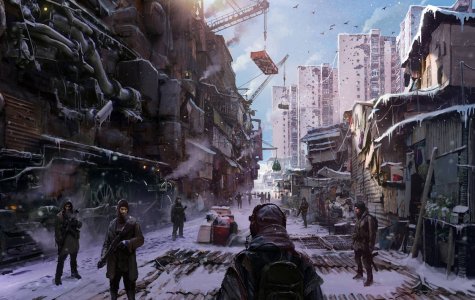 Freight handlers of the Longrailmen Guild carefully watch their cargo as station guards of the Rio Norte Guild look on under the dome-simulated snowfall of Taggart Transport
Freight handlers of the Longrailmen Guild carefully watch their cargo as station guards of the Rio Norte Guild look on under the dome-simulated snowfall of Taggart Transport
These five are not the only in the Cartel corporate democracy- there are innumerable smalltime local parties in any given base who agitate for local concerns. But the five are the most likely to have reoccurring franchises. They are the ones that dominate the linkwaves and election polls. And they have, in rare cross-partisan unity, appeared before the Planetary Council to call for functional constituencies to be recognized. That is, each corporation, guild, and other entity within the Cartel should deserve its own seat on Chiron's highest governing body, not only full-fledged factions. As ludicrous as the suggestion is, it has cachet from non-factional faiths (Sons of Centauri-Ra), multifactional corporations (Unicorp), decentralized political movements (INTEGR party), and factions-in-exile (the Holy See of Centauri).
These parties debate, attempt to legislate, and make the credulous who participate in the public process happy. Yet even as some speculate who might be the sixth party to round out their number, others suggest that activist activity among the Board of Directors is nothing but a dumbshow. A debate club, affecting little- not too different from the actual Planetary Council. Some claim that the true future divisions in the Chiron Cartel comes not from any paltry political party, but a genuine grassroots movement that has captured its imagination in recent mission decades.
The Marketeers

Managing Agent Halah Farid Al-Rammah said:
Central planners damn themselves with hubris. They think themselves gods who can corral a force of nature. But the market is the gestalt of uncountable best-laid plans. You cannot outthink the sum of all chaos. - The Butterfly’s Reply
Halah Farid Al-Rammah (هالة فَرِيد الرماح) Born near Samarra, Iraqi People’s Union. Child of a hydroelectric engineer and a store clerk. Spent much of childhood in neighboring Hashemite Jordan during the various neo-Ba’athist and Islamist uprisings that plagued the Soviet-backed communist government. After Jordan itself was attacked by Israeli forces in the Tripolar War, relocated to Southern California, where her parents started a business in the booming real estate industry. Attended London School of Economics at an accelerated age, receiving a BsC in Actuarial Science and a DsC in Theoretical Logistics. Worked as a supply chain risk analyst for Global Manticore, then as a datacaster for the Main Belt celestial shipping division at Lloyd’s of London.
Called back to homeland by familial obligations, and by an appointment to the Aleppo Axis’s Middle East Coalition Redevelopment Programme. Al-Rammah soon found herself dealing with a morass of political corruption and bureaucratic inefficiency, thwarting carefully crafted economic recovery plans. In time, her solution was to cut the Gordian knot: dispensing with the designs, she simply allowed competing interests to fight among themselves, canceling each other out while she quietly worked with small-time independent businesses to lift themselves out from the compromised main economy. There, in the shadow economy, market-based solutions thrived as canny operators crafted ingenious solutions to avoid red tape, taxes, and other shakedowns imposed by crooked civil servants. As she left the programme, shedding a tear at what WARPAC influence had done to her countries, small construction and manufacturing ventures popped up where there she had ensured a lack of onerous planning.
Employed by Al-Tamount Studios as a production executive in Mamoon. Managed on-location operational logistics for
The Final Countdown and greenlit the
Ganges horror franchise, Avril Walker’s last Earthside films. Subsequently returned to public service when
Unity project Jordanian contractors were faced with severe delays and cost overruns. Found replacement workers to build structural components on schedule, then secured alternative funding sources during budget crisis until Nwabduike Morgan stepped in. For service to the mission, fast-tracked to crew candidacy as a
Unity Economic Organizer.
A model home at Saddam Valley, named for the pre-communist era leader and one-time American ally, a developed community in Orange County. Built by Iraqi exiles during the mid-21st century suburban housing bubble, it typified the extravagant design that exacerbated manmade droughts precipitating the Second American Civil War
Joined the Peacekeeping Forces under Commissioner Pravin Lal during Planetfall. Her utter commitment to free market ideas made her a popular gadfly among the Talent intelligentsia. Psych profile suggests difficulty reconciling purity of her ideas with the routine realities of unexpected problems. Track record at U.N. Planning Authority shows repeated opposition against the Commissioner’s humanitarian concerns. Due to burgeoning bureaucracy and excessive oversight, a nascent frontier market failed to organically develop as per her suggestions.
Attracted a following of like-minded “economic naturalists” who decamped into the wild to build a new colony where their theories could be realized. By sheer serendipity, Liberty City was discovered by a Chiron Cartel scouting mission, and swiftly invited under the Charter. Rapidly grew the fledgling base while working in the overarching government. Heavily involved in the Cartel insurance marketplace, leveraging her actuarial background to work closely with underwriters to improve efficiency and profitability without sacrificing coverage. Seen as an exemplary citizen-client, and her Marketeers as assets to the faction, Al-Rammah rose through the ranks to contribute to the architecture of the marketplace itself. And then, she decided to revolt against her own work.
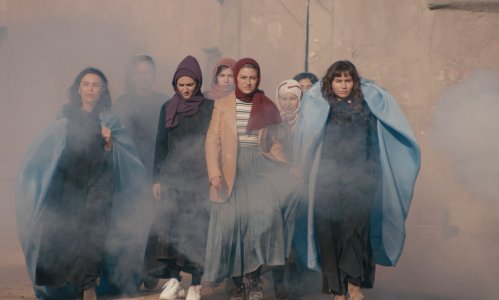 Mayor of Liberty City Al-Rammah leads evacuation away from a compromised base wall during a sandstorm, pre-Cartel contact
Mayor of Liberty City Al-Rammah leads evacuation away from a compromised base wall during a sandstorm, pre-Cartel contact
Managing Agent Halah Farid Al-Rammah said:
That morning, on a day like any other, I put on my metavisor and went to market. Streams of transactions, channels of balance sheets, islets of policies spun around me in perfect synchronicity. All of the Cartel’s economic activity could be seen- grasped. And in that moment, I felt like a central banker of old. With one flick I could mandate new premiums for thousands. With a nod I could change their rates. I threw the visor to the floor, my ears ringing with the unspoken thought: For competition to be true, all must be permitted. - Argyle Media special interview
Resigning from her ministerial post, Al-Rammah started her own project, the Free Market Zone. At the public unveiling she revealed its full scope- to compete with the Cartel itself. While previous underwriter syndicates within the Cartel marketplace did so specifically under the rules framework set by the Board of Directors, the Zone and its Marketeers imagine the abolishment of the minarchy in favor of something more radical: An anarcho-capitalist society.
Overnight, the project attracted widespread enthusiasm from outright ancaps, Rothbardians pining for Old Man Murray, full free market ideologues, those aggrieved against Cartel governance, and the hungry and foolish wanting to make fresh fortunes by disrupting a complacent space. Investment poured in from opportunistic corporations, even some Directors, and the Zone established its own syndicate within the marketplace as it vied to one day replace it entirely.
The Marketeers wanted the Cartel to go beyond. They wanted the market to have no state.
The Free Market Zone believes that even the night-watchman is too intrusive. They point out that despite its decentralized re/insurance marketplace structure, the government’s own Cartel Security provides the majority of internal policing and external defense. While a panoply of other private military corporations exist, most basic tier citizen-clients do not require them. This leads to a centralized monopoly on force within the faction (Even if it is notoriously lackadaisical compared to others’ armed forces, and the presence of near-unlimited armed private actors from individual citizens to large PMCs.) By being state-owned, the police are inherently beholden to political concerns (albeit already limited by the Charter), unlike the existing competing fire department and medical services solely provided by private companies. To those who uphold statist policing such as the Security Party, the Marketeers give them the epithet “neoliberal,” believing them addicts to public power.
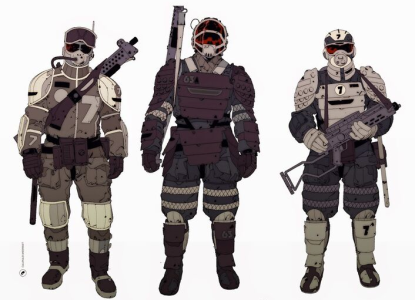 Cartel Security De-escalator units. Intended for civil disorder suppression, often used in supplementary vendetta combat roles due to the faction’s low frequency of Drone Riots
Cartel Security De-escalator units. Intended for civil disorder suppression, often used in supplementary vendetta combat roles due to the faction’s low frequency of Drone Riots
Marketeers also question the reliance on the Cartel’s legal code. They envision a multitude of subscription-based regulatory systems for citizen-clients, maintained by private Rights Enforcement Agencies. Instead of the state’s monopoly on law, these businesses would protect the rights of paying subscribers and settle disputes on their behalf. REAs could work out preexisting agreements with each other, use arbitrators to work out disputes. Private judges would be employed if necessary, easily replaceable if found to be corrupt or incompetent. Those who refuse to join
any REA, like current Cartel nonsubscribers, would open themselves to the option of settling conflicts with violence. But the already Charter-pegged low rate of subscription would become even cheaper, with a variety of legal frameworks to choose from. The Free Market Zone aims to be the very first REA, a prototype of the society-as-a-service that would replace the Cartel as currently known.
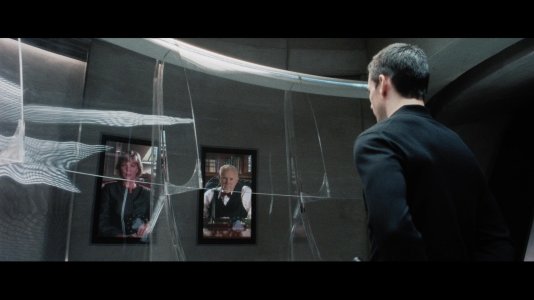 A Free Market Zone experimental prototype private sector judiciary. Former Cartel justices recruited as private judges serve witness to a Marketeer Private Rights Enforcer real-time investigation of a suspect ID’d by predictive analysis
A Free Market Zone experimental prototype private sector judiciary. Former Cartel justices recruited as private judges serve witness to a Marketeer Private Rights Enforcer real-time investigation of a suspect ID’d by predictive analysis
The Free Market Zone changed the formula of the Chiron Cartel. In a faction marked by constant competition, a movement now appears to challenge the government itself. A leading slogan of the Marketeers is “The Cartel must compete.” Whether for good or ill, much interest and excitement have surrounded this effort, spawning similar comprehensive protection plans and rival legal systems to challenge both Cartel and Zone.
Party reactions are mixed. The Charter Party establishment scoffs at the Marketeers’ temerity, while younger members find their ideals- “to think freer than the Charter” exciting. The Security Party bristles at the Zone’s accusations of authoritarianism, yet some members privately wonder if the state of factional security might improve with competition. The Industry Party is both thrilled by the prospect of weakening the Charter yet terrified at even fewer government opportunities for them to profit. The Consumer Alliance is flabbergasted at the prospect of abolishing what little state power there is, though they suppose it can be hardly worse than the status quo. And in their worker’s halls and meeting circles, the Guildsmen silently watch the events with interest, emotionlessly.
Director Nathan Weismuller himself is bemused with the whole effort. Since the beginning he had intended the Cartel to be a light touch, allowing for full freedom. And from its founding there had been rival attempts to create insurance companies and policies with societal codes that subscribers would prefer over the Board’s. Why this new entrant, with its triumphalist rhetoric and aggressive critiques, should catch such interest is a mystery to him.
Market skeptics accuse the Marketeers of having excessive reverence for the institution to the point of dismantling a minimalist state that already fails to protect against externalities. Under the Zone, they claim, ecological damage to Planet would be even worse. Splintering Cartel Security into a thousand pieces and scattering it into the wind would not exactly improve the foreign probe problem, even if one was to assume that a revitalized security market would rise up over time. And even if the faction population was to grow wealthier with greater efficiency, who could say what the repercussions are on demographic effects?
Market fundamentalists accuse them of the sin of interventionism, calling them “anti-monopolists,” a phrase that some of the Zone graciously accept. What is more anti-market by smashing the barebones state that oversees it? What is more criminal than imposing rival legal systems no one asked for over one that was elected by due process? Anarcho-capitalist members of the Marketeers reply that at least this is less bad than more government. The Cartel’s willingness to enforce law among non-subscribers is overreach, and by creating an alternative to its law, the Zone is enacting true freedom to willing customers. They would be the fulfillment of the founder's incomplete promise, realizing a profitable society with a market set fully free. And at her rallies, Al-Rammah simply promises an Energy Bank at every base.
Casting
Halah Farid Al-Rammah is portrayed by Alia Shawkat as Mae “Maeby” Fünke on
Arrested Development, as Laila / “Farah” in
Shako Mako (
Miu Miu Women's Tales #17), and as Dory Sief on
Search Party
Phillip Rickenbacker is portrayed by Ben Daniels as General Bel Riose on
Foundation
Notes
Free Market Zone / the Marketeers are a custom faction from
5 Custom Factions by Pickly,
txt file here. Since it is also a libertarian faction, albeit with different mechanics, I’ve decided to combine the two. Neither the Marketeers nor Al-Rammah are portrayed as anarcho-capitalist in the original mod, but I decided to cast them as such as a potential splinter faction / future controlling power of the Cartel, rather than the obvious statist off-shoot.
The idea of the Chiron Cartel’s ‘government’ being an insurance company comes from the
SMACFacPack backstory. Replacing the state with insurance companies also seems to be an ancap concept, see the video in previous segment’s notes. I chose to model it after
Lloyd’s of London since a marketplace instead of a specific insurance provider felt more appropriate for the premise, and for its
venerable history and traditions originating from a previous age of colonialism.
How the Lloyd's market works is a helpful visualization of its process.
“Understanding our marketplace” is a good glossary of definitions.
Phillip Rickenbacker is a minor named character in the SMAC Fac Pack quote
blurbs.txt
Guilds serve three-fold story purposes: they call the bluff of libertarian guarantees of free association by having labor exercise it as handily as capital does; they clean up after the implications of a libertarian government by explaining how a bloody worker’s revolution might be averted by said employees gaining a modicum of representation, autonomy, and decent working standards under said megacorps; and they are a sop to the neoliberal portrayal of unions as power-hungry by suggesting that they might behave like the very corporations themselves, even lobbying against state-provided welfare because it could challenge their own monopolies. Also, the naming provides a lighter space opera vibe to the serious question of labor relations - speaking of which, “functional constituencies” I got from
this video about the Galactic Senate in Star Wars (10:03-11:00).
Caveat venditor is Latin for “let the seller beware.” It’s
an actual legal term.
Since Saddam Hussein’s final fate has not yet been mentioned in this timeline, here I have him switching to the Americans after defeat by the Iranians (perhaps suggesting a rift between the U.S. and the Shah) sometime in the ‘90s or ‘00s. The Soviets finally ditch the unworthy satellite and replace him with local communists, and so a young Halah Farid Al-Rammah grows up in a dysfunctional planned economy.
In retrospect, I probably should have had the Cartel start as a single insurance company and the Marketeers advocate it be turned into a Lloyd’s-type insurance market, to make their distinction sharper, but these ideological squabbles are heavily characterized by the narcissism of small differences anyway, so oh well.
Private Rights Enforcement Agencies are mentioned in the theories of David Friedman.
Image Credits
Ads-plastered futuristic walkway is
City of Newcrest by Orelf (
Aurelien Fournier)
Sci-Fi Industrial Base - Unreal project Low-poly 3D model is by manufacturak4
Sci-fi mercantile trading floor is from
Endless Space 2
Guards standoff at a snowy train station is
Postapo train by 5ofnovember
The Saddam Valley model home is a Sudden Valley Bluth Company model home from
Arrested Development
Padded armor security are concept art of
Seegson Security Guards from
Alien: Isolation
Remote witnesses scene is from
Minority Report
Further Reading
What is Lloyd’s of London?
The Libertarian Argument for Unions, Cambridge University Press
Imagine There's No Law; It's Easy If You Try,
Pacific Standard
Gun Governance without Government, Tomasz Kaye
Anarcho-Capitalism Isn't Crazy, Just Ahead of Its Time, Bryan Caplan
Thatcherism: What We Get Wrong About Neoliberalism
Shako Mako, Short of the Week






















